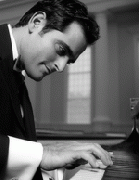There are still plenty of things the outside world doesn’t understand about Arab culture, but in the quest to inform more people about its accomplishments and beauty, the potential of using the universal language of music can’t be overstated.

|
|
Syrian composer and pianist Malek Jandali: “The goal was to make sure to take the melody and present it in a new way, yet at the same time make sure to preserve the original as much as possible.” |
The centerpiece of the album is the title track, which also happens to be the oldest musical notation in the world. Re-created from clay tablets dating back to about 3400 B.C. and written in cuneiform script, the rich, soothing classical piece based on an ancient religious hymn is performed with Jandali on piano alongside the Russian Philharmonic Orchestra, transporting the listener back to an entirely different and simpler time.
Jandali, who was born in Germany and traveled to Damascus to study music as a child in his former hometown of Homs, Syria, took four and a half years to complete the CD.
Most of the time was spent on transcribing, interpreting and faithfully reproducing the melody that would become the title track. For example, a replacement was needed for the ancient Syrian kinnara instrument, and Jandali chose a traditional harp for use in the song.
“The goal was to make sure to take the melody and present it in a new way, yet at the same time make sure to preserve the original as much as possible,” Jandali said.
Syria was also home to the world’s first alphabet and the world’s first painting. It is the spirit of ancient Syria and its great cultural and historical achievements that Jandali hopes to convey in the album.

“The main message behind my project is to give a positive image of our heritage, to shed light on the fact that Syria had the oldest music notation in the world, and to promote cultural understanding and harmony,” he said.
Of course, in order to do that, the music has to reach as many pairs of ears as possible. Jandali has taken some interesting steps to make sure that happens, signing a landmark record deal with England-based Virgin Megastores to promote the album along with Middle East-based record company Alam Al Fan. Virgin has expanded into the Middle East and plans to open five stores in Syria, where purchases of physical CDs remain strong and downloads aren’t as popular.
Jandali is also actively promoting his music on the networking sites Facebook (under his name) and Twitter under the name MalekJandali (all one word) along with his personal Web site www.malekjandali.com.
He even took the unique step for a classical artist of producing a music video for the song “Piano Dream,” an upbeat, playful song and video that can be seen on Youtube.com and on Middle Eastern satellite channels such as the music channel Mazzika. So far it’s worked, leading to more interest and interviews from outlets like National Public Radio (NPR) and Al Jazeera.
Jandali said the song, along with the other five original tracks on “Echoes from Ugarit,” was inspired by the vibe and feel of the title track and mixes both classical and Arabic music styles.
Other notable tracks include “Eid,” which is based on Syrian folk music and is inspired by memories of the Muslim holiday in Jandali’s home country, and “Arabesque,” which is inspired by the art style of the same name seen in the Arab world. Another song, “Yafa,” has a warm, emotional feel to it and is dedicated to the suffering, war-torn populations of Iraq and Palestine.
“The other seven tracks are based on actually mixing the Arabic or oriental maqams or modes with Western harmony and orchestration, so it’s oriental music with a symphonic Western orchestration,” Jandali said.

“The main difference in harmony is ours (Arabic) is basically linear whereas Western music is more vertical with chords; it adds a different dimension to the music.”
Delivering his message personally is a big part of Jandali’s mission as well, and next week, he expects to meet with former U.S. President Jimmy Carter at the Carter Center in his hometown of Atlanta to discuss his work. The mission statement of the center sounds a lot like Jandali’s musical vision, as the center seeks to bridge the gaps between cultures and to promote a message of harmony and peace.
Following that visit, Jandali will get ready for one of the biggest performances in his life at the Cairo Opera House on October 8 in front of a crowd of about 650 people with the Cairo orchestra, the oldest in the Middle East.
“It will really be an honor to perform there,” Jandali said. “It’s one of the most prestigious venues in the Middle East and legends have performed there; this is an important step in presenting the project in the region.”
As far as future plans, Jandali has many, including a possible visit to the University of Michigan, thanks to the efforts of Honorary Consul of Syria, Dr. Naji Arwashan, as well as a likely performance before the end of 2009 at the United Nations Headquarters, thanks to the work of Syrian Ambassador to the U.N., Dr. Bashar Shabaan.
It’s all part of Jandali’s commitment to delivering the messages of his music and the ancient pioneers of Syria to the large, multi-national audience it deserves.
“This project is an attempt to present the rich musical heritage of Syria,” he said.
“I have always felt that music eloquently expresses the inherent connection between the past and the present. In all cultures throughout history, it has served as a humanizing force, which is common to all.”






Leave a Reply